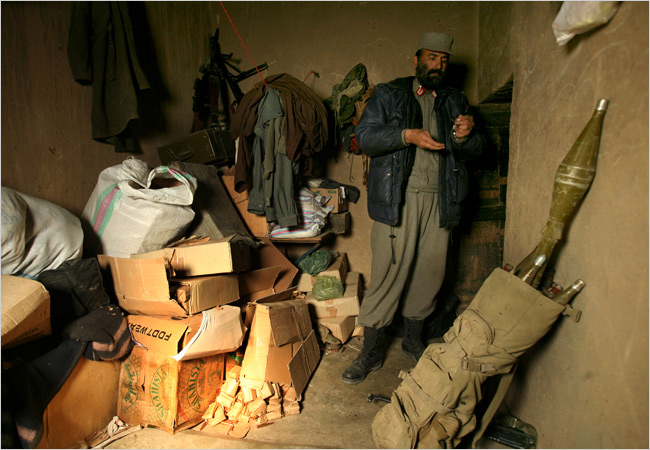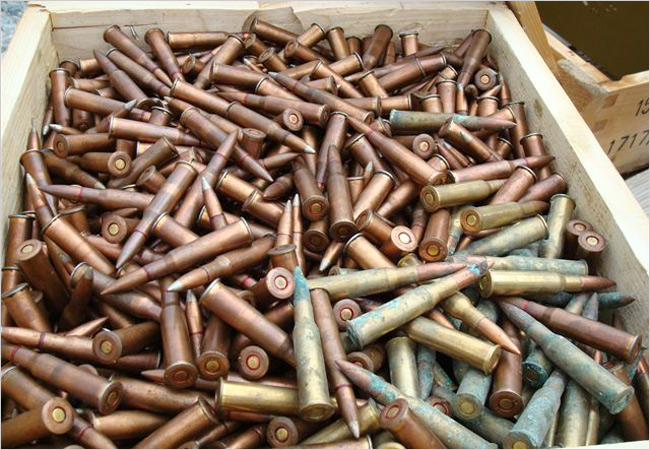Since 2006, when the insurgency in Afghanistan sharply intensified, the Afghan government has been dependent on American logistics and military support in the war against Al Qaeda and the Taliban.
But to arm the Afghan forces that it hopes will lead this fight, the American military has relied since early last year on a fledgling company led by a 22-year-old man whose vice president was a licensed masseur.
With the award last January of a federal contract worth as much as nearly $300 million, the company, AEY Inc., which operates out of an unmarked office in Miami Beach, became the main supplier of munitions to Afghanistan’s army and police forces.
Since then, the company has provided ammunition that is more than 40 years old and in decomposing packaging, according to an examination of the munitions by The New York Times and interviews with American and Afghan officials. Much of the ammunition comes from the aging stockpiles of the old Communist bloc, including stockpiles that the State Department and NATO have determined to be unreliable and obsolete, and have spent millions of dollars to have destroyed.
In purchasing munitions, the contractor has also worked with middlemen and a shell company on a federal list of entities suspected of illegal arms trafficking.
Moreover, tens of millions of the rifle and machine-gun cartridges were manufactured in China, making their procurement a possible violation of American law. The company’s president, Efraim E. Diveroli, was also secretly recorded in a conversation that suggested corruption in his company’s purchase of more than 100 million aging rounds in Albania, according to audio files of the conversation.
This week, after repeated inquiries about AEY’s performance by The Times, the Army suspended the company from any future federal contracting, citing shipments of Chinese ammunition and claiming that Mr. Diveroli misled the Army by saying the munitions were Hungarian.
• • •
C. J. Chivers and Eric Schmitt. "Finding of Fraud Led to Suspension of Company Supplying Arms to Afghanistan"
When the United States Army decided this week to suspend the main supplier of munitions to Afghan security forces from future federal work, it did so after a field investigation documented what it called an act of fraud.
Last Nov. 25, the president of the company, Efraim E. Diveroli, signed papers certifying that 28 pallets of ammunition for Afghanistan had been manufactured by MFS 2000, a Hungarian company, according to the investigators’ memorandum.
Acting on a tip, the Army’s Procurement Fraud Branch visited an Afghan ammunition storage site in January after the shipment arrived. There, investigators found that ammunition certified as Hungarian was actually made in China, according to the memorandum.
Mr. Diveroli declined to comment, and has 30 days to contest this finding.
The investigators’ discovery did more than lead to his company’s suspension. The discovery placed him at risk of a federal criminal charge of fraud. And it raised questions about how Army contracting officials have been securing arms for the Pentagon’s allies in Afghanistan and Iraq.
Mr. Diveroli’s company, AEY Inc. of Miami Beach, received a two-year contract in January 2007, potentially worth $298 million, to provide Afghan security forces with ammunition. At the time, Mr. Diveroli was 21.
An examination of the company’s business by The New York Times, reported on Wednesday, found that it had shipped tens of millions of decades-old Chinese cartridges to Afghanistan, almost all of them in poor packaging. AEY has also worked with middlemen and a shell company that are on a list of federal entities suspected of illegal arms trafficking and that have been accused of corruption ....
.... Interviews with military officers, American officials, international arms dealers and private organizations that monitor them suggest that the problems with the Afghan contract were rooted in part in AEY’s business conduct. But they stemmed as well from how Army procurement officials write contracts and vet and supervise companies that receive them.
Nicholas Marsh, a research fellow at the International Peace Research Institute in Norway who studies the arms trade, said AEY’s work with suspicious middlemen was part of a pattern for purchases of foreign munitions for the Pentagon.
Under American law, arms dealers must notify the State Department of everyone they do business with in a given arms transfer, including middlemen, brokers, sellers and transport companies. As a practice, the State Department checks subcontractors and partners against a watch list, which is regularly updated by analysts and with information from embassies around the world.
Purchases for the Pentagon, however, are exempt from this law and practice. Middlemen have rushed into the deals, without the Pentagon’s contractors disclosing the relationships. “You see people subcontracting and subcontracting all over the place,” Mr. Marsh said. “It’s a huge mess.”
Military officers and a private arms dealer also said that insufficient quality-control standards were evident in many Army purchases of foreign arms.





No comments:
Post a Comment